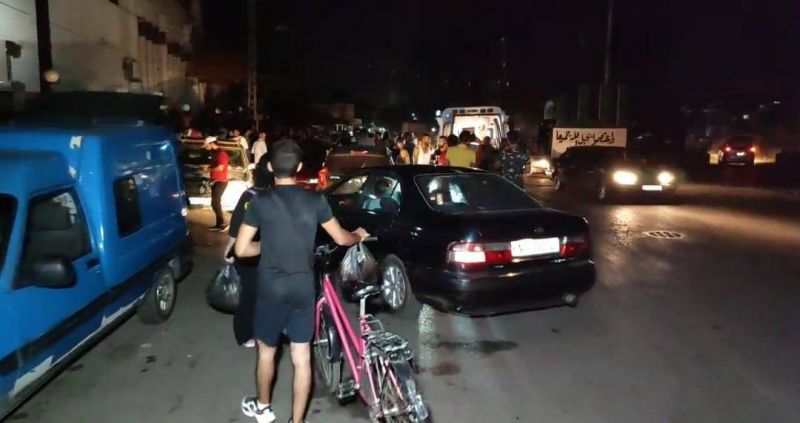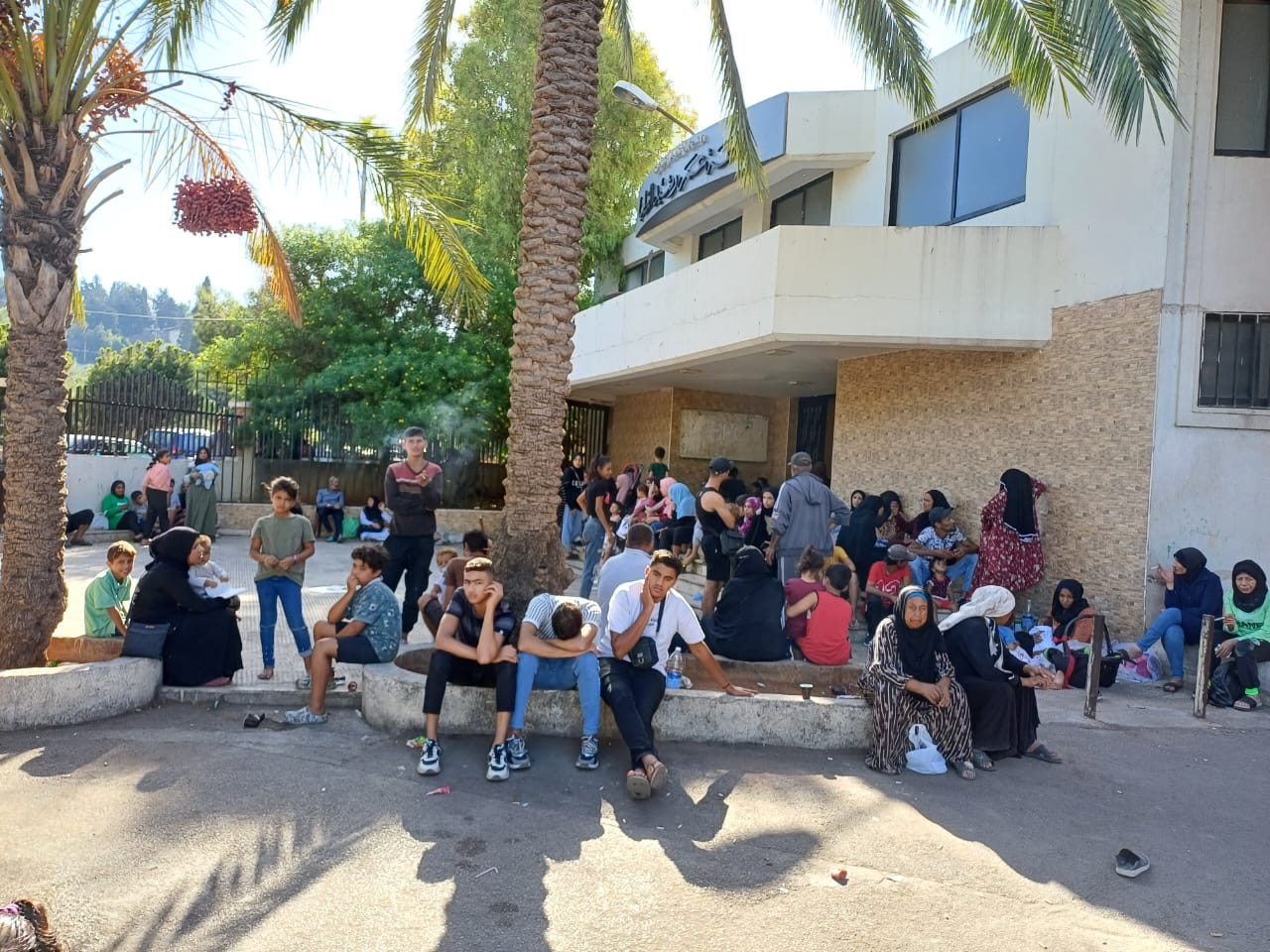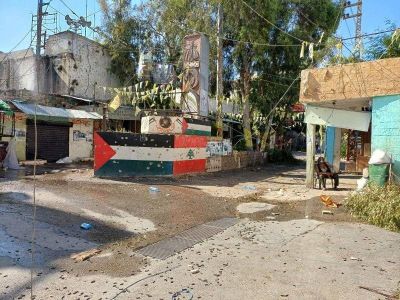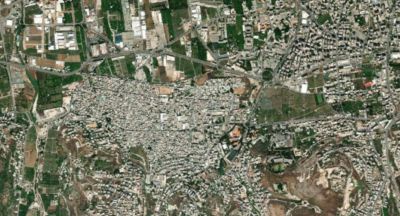
Clashes broke out on Thursday evening between Fatah and the Islamic group Jund al-Sham in the Palestinian refugee camp of Ain al-Hilweh. (Credit: Mountasser Abdallah/L'Orient Today)
BEIRUT — A ceasefire was reached on Friday night between Fatah and armed Islamist factions in the Ain al-Hilweh Palestinian refugee camp near Saida, after hours of sporadic clashes, which eased at around 6 p.m., L'Orient Today's correspondent in the area reported.
According to Palestinian sources within the camp, the ceasefire agreement was reached following mediation efforts led by Souhail Harb, director of the Lebanese army's intelligence services in the south, who organized a meeting between Fatah and Hamas officials during the day.
This round of fighting, which started on Thursday evening, injured 20 people and displaced hundreds, multiple medical sources in the camp told L'Orient Today's correspondent on the ground.
The Palestinian Red Crescent, which was aiding camp residents, said civilians were among the 20 injured.
A member of the Lebanese General Security sustained injuries to the head from stray bullets Friday, and the directorate office of the Saida barracks were damaged, the state-run National News Agency reported.
The wounded security officer was transported to Hammoud Hospital in Saida, were he underwent surgery, according to the state run National News Agency.
 People taking refuge outside al-Mousalli mosque, Sept. 8, 2023. (Credit: Mountasser Abdallah/L'Orient Today)
People taking refuge outside al-Mousalli mosque, Sept. 8, 2023. (Credit: Mountasser Abdallah/L'Orient Today)
On Friday afternoon, shells from the clashes reportedly fell on the rooftop of the government building in Saida's barracks, damaging the rooftop significantly and shattering the glass of an office.
A source inside the camp told L'Orient Today that the Palestinian Green Crescent's ambulance was hit during the clashes.
The source also told L'Orient Today that the clashes reignited in the afternoon the bodyguard of a senior Fatah member was killed.
The head of Fatah's Palestinian National Security in Lebanon, Sobhi Abu Arab, called once again for the handing over of the killers of Abu Ashraf al-Armoushi, the Fatah-affiliated head of security in Ain al-Hilweh who was killed last month.
Abu Arab also said the clashes took place to prevent the expulsion of armed factions from UNRWA schools, which have been occupied since the end of a previous round of clashes that ended early August.
On this matter, the United Nations Resident Coordinator and Humanitarian Coordinator for Lebanon, Mr. Imran Riza, issued a statement Friday night, calling for an end to the fighting and the expulsion of armed factions from the schools.
"The ongoing takeover of eight UNRWA schools, is preventing the access of nearly 6,000 children who are about to begin their school year," Riza added.
The initial eruption of violence in the camp left around a dozen people dead.
Hundreds of camp residents fled their homes Thursday and took refuge at the nearby al-Mousalli mosque.
L'Orient Today's Saida correspondent reported relative calm by Friday noontime, with some sporadic gunfire still audible.
"There are contacts between the Palestinian embassy and Lebanese officials as well as Palestinian factions to bring about a ceasefire," Fouad Osman, a Palestinian Liberation Front (PFL) official in the camp, told L'Orient Today.
Clashes overnight
The clashes began overnight on Thursday, with sounds of gunfire and machine guns reaching nearby districts of Saida, according to our correspondent.
A Fatah source told L'Orient Today that the group's fighters were "defending" their position being "targeted by gunfire and rockets from Islamist extremists" at the northern entrance to the camp.
A stray bullet reportedly wounded a man who was outside the combat zone, in the Taamir district, south of Saida, according to residents and medical workers. Two rockets also fell outside combat zones, causing material damage. The Lebanese army reinforced its positions at the entrances to the camp.
Videos shared online showed families carrying children and their belongings to seek shelter in the al-Mousalli mosque just outside the camp late at night.
People take refuge in mosque
The supervisor of the al-Mousalli Mosque told L'Orient Today on Friday afternoon that there were 700 people taking refuge in the premises, most of them children, women and elderly people. He added that "around 300 others were transferred to the Saida municipality."
A woman at the mosque who introduced herself as Umm Omar said she escaped from the Taamir area of the camp during the fighting. "At every gunshot, we flee the camp unclothed and barefoot ... we only want to return to our houses."
One woman sheltering next to the Saida municipal building told L'Orient Today that she "has diabetes and does not have medication with her."
Israa Hassan, an Ain al-Hilweh resident who also fled the camp on Thursday, said that her brother's house in the Bustan neighborhood was destroyed.
Saida Municipal Police Chief Bader Kawam told L'Orient Today that around 70 Palestinian and Lebanese people fleeing Ain al-Hilweh came to the municipality on Thursday.
"I talked with the municipality to secure a safe place for them," he noted. Until then, the displaced families will stay in the municipality building.
According to Kawam, 260 people were sheltering in the municipality by Friday. He added that two groups were providing aid, including food and water. Medications were also secured through volunteers and an Islamic association.
Violence following discussions
Earlier in the day, the joint security committee in Saida met at the home of Maher Chabayta, a Fatah general, in Ain al-Hilweh. The committee decided, among other things, that it was "necessary to evacuate the schools [of fighters] and put them under the control of the joint force."
In late August, the United Nations Relief and Works Agency for Palestine Refugees (UNRWA) announced a temporary 24-hour suspension of its operations in the camp in protest of the ongoing presence of combatants in its schools and facilities.
The same source also accused Islamist fighters of preventing security forces from arresting those responsible for the July killing of Abu Ashraf al-Armoushi, the Fatah-affiliated head of security in Ain al-Hilweh.
Armoushi and four of his bodyguards had been killed in an apparent tit-for-tat series of targeted murders.
Abu Ayad al-Chaalan, Armoushi's subsequent replacement, claimed to L'Orient-Le Jour that Islamist fighter Bilal Badr, "who works with Daesh," was behind the assassination.
The resulting late July clashes between Fatah and other Islamist groups in the camp left 13 people dead and forced some 350 families to flee their homes for safety.
Ain al-Hilweh, Lebanon's largest Palestinian refugee camp, is home to more than 54,000 registered Palestinian refugees. They have been joined in recent years by thousands of additional Palestinian refugees fleeing the war in Syria.
The densely populated camp is regularly the scene of shootings and clashes, usually due to personal disputes or tensions between various Palestinian factions.

